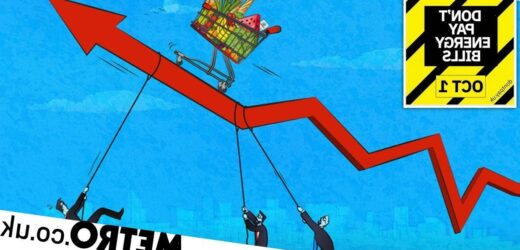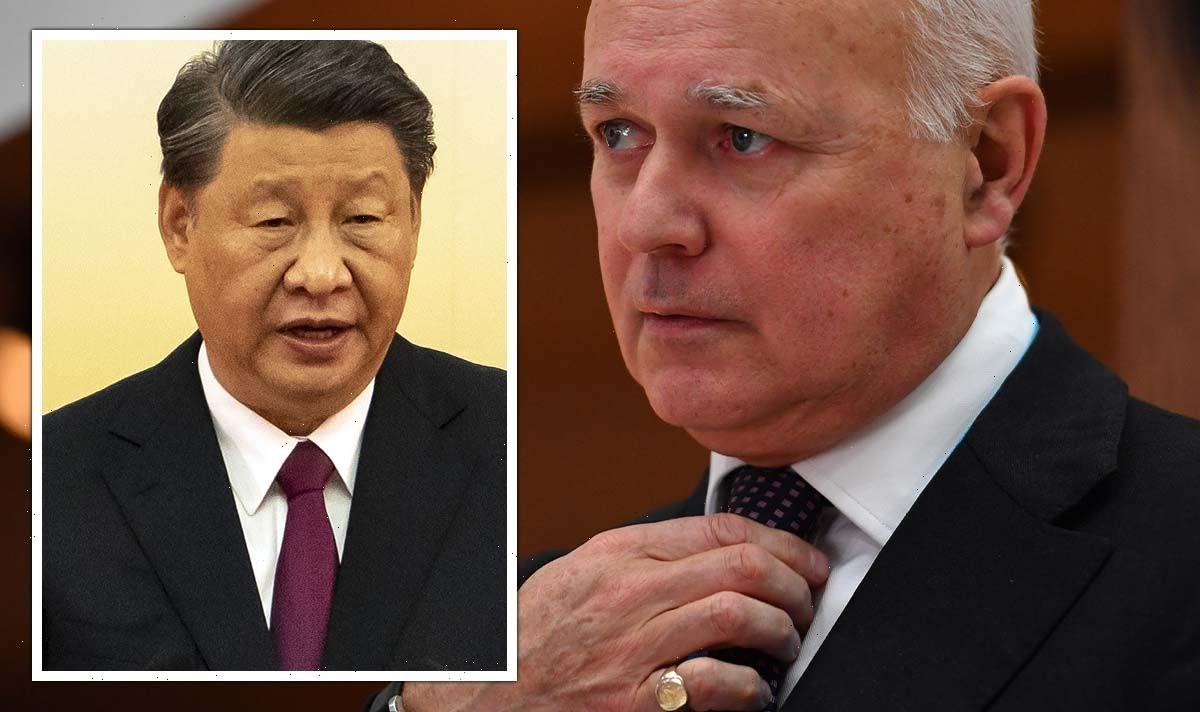Would you consider committing to not paying your energy bill?
A UK campaign is calling for 1million households to pledge that they will stop paying energy bills from October 1, in protest against price increases amid the cost of living crisis.
The group, run by several anonymous activists, launched its Don’t Pay UK campaign in mid-June and, within a week, has already accrued over 4,000 people who have signed up to support the initiative.
A non-payment campaign is when people collectively commit to not paying a bill or charge.
The group claim to be inspired by the resistance to the Poll Tax and associated protests that helped bring down Margaret Thatcher’s government when 17 million people refused to pay the poll tax, known as the ‘Community Charge’ in 1990. In the end, it became impossible for the Thatcher government to successfully implement the policy.
The premise
In the face of the living crisis and the highest inflation in years, the Don’t Pay campaign is aiming to get 1 million out of the 28 million UK electricity customers to stop paying their monthly direct debit if ‘no action is taken to reduce an expected price hike in October’, in an attempt to gain affordable energy for all.
The Don’t Pay manifesto says: ‘Millions of us won’t be able to afford food and bills this winter. We cannot afford to let that happen. We demand a reduction of bills to an affordable level. We will cancel our direct debits from October 1st if we are ignored.
‘We’re not affiliated to any organisation, nor do we have a set list of demands.
‘We’ve come together as we think an energy bill non-payment strike is not only necessary as a means of powerful, mass collective action in the cost of living crisis, we think it’s also one many people are considering already up and down the country.
‘Whether people can’t pay because it’s simply too expensive or whether they don’t want to pay because they don’t see how it’s fair to pay so much, this idea could mobilise millions of people.’
The problem
Energy costs have risen dramatically this year. With the annual cap, the maximum amount a utility company can charge an average customer per year for the amount of electricity and gas they use, has risen by almost £700 to almost £2,000 in April.
Another price hike is expected again in October to almost £3,000.
According to the ONS, energy prices continue to be the main driver of inflation, which is expected to reach a 40-year high, soaring towards an expected 11 per cent this autumn.
And while chancellor, Rishi Sunak, announced a £15billion package to help provide one-off payments for households in need, Don’t Pay states that this will not help those who need it most.
National Energy Action (NEA) estimates 11,400 winter deaths are already caused by cold every year.
But by this winter, 6.3million households won’t be able to afford their energy bills, according to Don’t Pay UK, and 10million households will be in ‘fuel stress’, meaning they spend more than 10% of income on energy bills alone.
The campaign
‘We started this campaign because we were worried about how we will pay our energy bills,’ a spokesperson from Don’t Pay UK tells Metro.co.uk. ‘Energy bills are at the centre of the cost of living crisis.
‘Everyone needs access to electricity and gas to warm, light and live comfortably in their homes.
‘But everyone around us is struggling, and we know it will only get worse with no end in sight.
‘That’s why we came together as a group to strategise and think of ways we could collectively fight this.’
https://www.instagram.com/p/Ce9nkpiNHPs/
The campaign is using social media to gain momentum. So far, around 20,000 leaflets have been ordered from the website by people looking to join the movement across areas of England, Scotland and Wales.
‘We are not finding supporters; supporters are finding us,’ Don’t Pay UK says. ‘We think this idea is so powerful it has captured an imagination that not only gives people hope but is a concrete strategy to confront this crisis.
‘So far, around 1,300 people have expressed an interest to become an organiser in their town, village and city,’ says Don’t Pay UK.
‘From there, we will fan out the campaign with a local presence to set up Don’t Pay UK groups.
‘These will be spaces where local people can meet and organise in and against the cost of living crisis.
‘Much like the covid mutual aid groups, people want to look after each other and provide for their needs, and this campaign is bringing all sorts of people together.
‘When we have built support, and our campaign has reached a critical mass of a million pledges, we will make it known to the government and energy companies what they will face unless they take a drastic intervention. If the government ignores this movement, we will go on payment strike from October 1st.’
Supporters
‘People have been telling us that they signed up [to the campaign] because their situation is getting worse,’ Don’t Pay UK tells Metro.co.uk.
‘One person emailed us a few days ago to tell us their gas bill increased by over 50% to £333 this month.
‘They are a house of five and cannot afford to pay their bills, especially if they go up again in October.’
‘The price of everything is going up: food, petrol, gas, rent. I live in London but I work across the South East, I’m being priced further and further out of the city,’ the construction worker tells Metro.co.uk.
‘I live in Streatham with three others, but the rent is still £650 a month, with an additional £250 for council tax, gas, electricity and water.
‘I can’t save any money; I’m trapped on high interest credit cards and half my salary is just going to my housing.’
The situation has turned bleak for Steve over the past few months.
‘My clothes are falling apart, I can’t afford the dentist, I can’t replace things which break,’ he says.
‘I don’t see what else I can do.
‘I have already cut my spending back to the bone, I shop in the reduced section and avoid going out. Unless I get a better job, I can’t do anything else – it’s out of my control.’
After seeing a post on a Fuel Protest facebook page, Steve became aware of Don’t Pay UK.
‘It seems like a brilliant idea. I don’t see what I have to lose,’ Steve says. ‘There’s strength in numbers and something has to change because people are really starting to suffer now.
‘Lots of my mates at work are in a similar or even worse situation than me and have said they will [support the campaign] too because they also have no other option. There is a lot of anger out there.’
While Steve is nervous about the risks of non-payment he is also nervous ‘about paying bills.’
‘They say [bills] will go up again in October,’ he shares. ‘I am scared about how I will afford to live this winter.
‘Doing nothing is more frightening to me than doing something. If a million other people [support the movement] then it’s worth a shot.’
Risks of non-payment
‘There are many risks associated with non-payment campaigns,’ Miles Robinson, Chief Commercial Officer at Haysto, tells Metro.co.uk.
‘Legally, there isn’t much support for non-payment campaigners. If you’re using energy, you’re expected to pay your bills.
‘Any unpaid bills will put your account into debt, and your energy provider can get debt collectors to enforce that. You will also be at risk of being cut off by your provider.’
While Miles acknowledges that mass non-payment has worked in the past and says that ‘a lack of payment could pressure energy suppliers to lower their prices’, he warns that energy suppliers may feel pressure to claim debts ‘as they battle out such campaigns’.
‘Many UK citizens are in a difficult situation battling the worsening cost-of-living crisis,’ he said. ‘And it is affecting renters trying to get onto the property ladder and homeowners.’
If you need help or support paying your utility bills, Miles suggests speaking to your energy provider to ‘agree on a payment plan’.
‘They won’t cut you off if there is discussion,’ he says. ‘And any debt you have to an energy supplier, you may be able to pay off with benefits such as the Fuel Direct Scheme.’
Bill Ryze, a certified Chartered Financial Consultant (ChFC) from Tennessee, warns that problems could arise if one million UK customers stop paying their energy bills.
‘If all customers stopped paying their bills, energy suppliers would not have enough money to buy the gas and electricity needed to keep the lights on. This could lead to blackouts,’ Bill tells Metro.co.uk.
‘If suppliers cannot get the money they are owed, they may need to increase prices for everyone else to compensate. This could result in widespread price increases.
‘If suppliers cannot get the money they are owed, they may need to cut jobs to reduce costs. This could lead to widespread job losses in the energy sector.’
Bill also warns that it could lead to a financial crisis if mass non-payment leads to widespread job losses and price increases, triggering declining confidence in the economy.
But he does suggest that a non-payment campaign is likely to work if ‘the result is an open dialogue between the government, vendors, and citizens’.
‘However, we should keep in mind that a campaign of mass non-payment is likely to be disruptive and may not be well received by the public,’ he warns.
Will it work?
Don’t Pay UK is well aware of the risks associated with mass non-payment.
They are discouraging involvement from the 4.5million people on prepayment meters who face self-disconnection if their credit runs out, as well as those whose energy bills are included in rent and risk eviction if bills go unpaid.
Instead, the campaign asks these people to ‘spread their message and show support’.
While there are risks associated with mass-non payment, Don’t Pay says that risks associated with huge energy bills are much more severe than the risks associated with mass non-payment.
‘There is no absence of risk. Whether you pay or not, the risk is increasing as we head towards the winter,’ a spokesperson for Don’t Pay UK explains.
‘We believe that collectivising the risks, standing together and united around this movement is the best chance to bargain with the government and energy companies for a radical transformation of the situation.’
There are also concerns about the protection of those who join the movement and refuse to pay their bills come October.
‘Our main protection is numbers,’ a spokesperson for Don’t Pay UK explains. The group claims to be offering a strategy out of this crisis, and while ‘no one really knows what would happen if a million people cancel their direct debits’, the organisation hopes that ‘a huge number of people acting together would force energy providers to come to an agreement’.
Don’t Pay UK, who are keen to remain anonymous, said they want the focus to be on the campaign rather than those involved.
‘It is not about us,’ they add. ‘This is not our idea.
‘Many people have told us that they’ve been thinking about this for a while. We are just the ones that put the work into it with the necessary skills and strategy.
‘We are making this a collective action. Currently, we are all individualised, atomised and scared. We need to bring everyone together.’
The campaigning group explains that ‘we are in a unique situation’ and hope that ‘this movement will break the fear and create the hope we need to challenge the energy oligarchs and government and force them to radically change course’.
‘Demands without leverage are just ignored,’ they say. ‘We believe we can build that leverage through the threat of mass non-payment, so we create the necessary power to ensure we cannot be ignored.
‘This is the best hope we have to ensure we gain affordable energy for all.
‘If we win, we all benefit.’
Do you have a story to share?
Get in touch by emailing [email protected].
Source: Read Full Article




